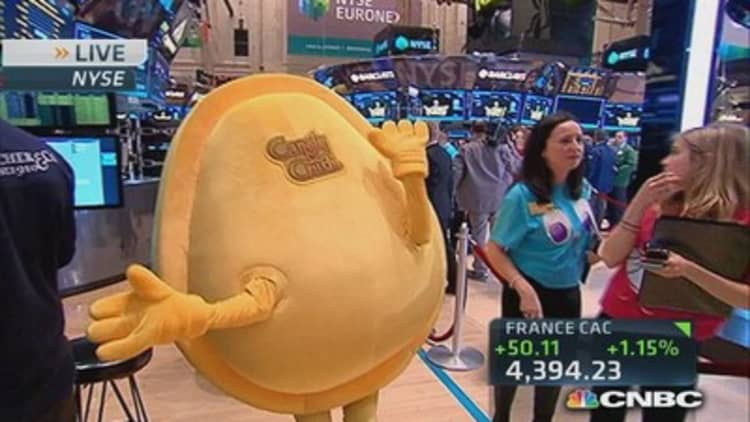Since its launch nine months ago, "Cookie Jam" has climbed into the top 20 grossing games in Apple's iOS and Google's Play store, and was named Facebook's game of the year for 2014.
So what's next for the skyrocketing game? China.
SGN, the developer of the mobile puzzle game, is partnering with NetEase, a Chinese Internet and games service provider, to distribute "Cookie Jam" in the world's most populated country, starting in early 2015.
"We talked to a half dozen folks in China and got really comfortable with NetEase in terms of its distribution and ability to navigate the market," said Chris DeWolfe, chief executive officer of SGN (which stand for Social Gaming Network), in Los Angeles. "China is the fastest-growing country in the world in terms of mobile revenue and mobile game revenue. To have a big footprint in China is super important."
Read MoreWhat's in Zynga's pipeline?
For DeWolfe, who previously co-founded MySpace, it's the next step in attempting to create a sustainable company in the highly fickle universe of mobile and social games. Remember Zynga's struggle to move from Facebook to smartphones? Or when "Angry Birds" was the hottest thing on the planet? Creating a portfolio of successful games on a diversity of platforms across the globe is no easy feat.
"Cookie Jam" follows a formula that's familiar to anyone who's been addicted to a casual matching game. Like "Candy Crush" or "Bejeweled," the idea is to match like items to get through stages, a task that gets more challenging as you progress. In "Cookie Jam," the theme is—surprise surprise—desserts. Players are asked to match up the ingredients that go into a recipe for a type of cake or cookie.
If unable to complete the recipe within the free game, users can pay inside the app to advance. The combination of a ton of users —"Cookie Jam" has 5 million on Facebook alone—and the right pricing scheme can lead to a booming business. In naming "Cookie Jam" its game of the year last week, Facebook said, "This colorful matching game proved that the genre is far from over for Facebook."

"Cookie Jam" is SGN's most successful game yet. The company consists of multiple studios that DeWolfe has acquired since 2010, when he raised more than $25 million from Austin Ventures to build a gaming empire. SGN is currently promoting five games, including "Panda Pop" and "Panda Jam."
To crack China, DeWolfe said finding a prominent local partner was critical, because the mobile business is so much bigger and more fragmented than in the domestic market. In the U.S., SGN builds for four app stores: Apple, Google, Facebook and Amazon.com. But in China, there are 12 stores, and each requires dealing with different people, unique technical specifications and separate contracts, he said.
By connecting with NetEase, a Beijing-based company with a $13 billion stock market value on Nasdaq, SGN is dealing with a brand that has "massive experience in game publishing," DeWolfe said. "We're seriously attacking the global market, where we think there's still a lot of money on the table."
Read MoreKing has transferable network
It's a critical time to get there, because the biggest Chinese Internet companies are investing in other U.S. game developers to speed global expansion. Tencent bought a majority stake in "League of Legends" developer Riot Games in 2011. And in September Alibaba poured $120 million into Kabam, the creator of "Kingdoms of Camelot."
While entering China may be SGN's biggest project for 2015, new titles are also on the horizon. The company is currently generating $150 million-$160 million in annual revenue, after growing 400 percent in 2014, and DeWolfe said he expects to introduce four new games next year, not including any potential acquisitions.
As for tapping the public markets? Not likely anytime soon. Seeing the challenges that Zynga has faced on the market and the shakiness of King Entertainment, developer of "Candy Crush," since its initial public offering in March, DeWolfe is content to wait, and grow.
"Public markets now in gaming are very volatile," DeWolfe said. it's not worth taking the plunge until the business has reached "critical mass," he said.


